Climate Change Research Milestones
On this page, view by decade:
EPA research improves knowledge of the impacts of climate change on human health and the environment. This scientific information along with tools developed by EPA researchers can be used by communities to effectively, equitably and sustainably tackle the climate crisis.
2020s

2024-Measuring Methane Emissions
Methane emissions from landfills are a crucial contribution to climate change. In 2024, EPA scientists made significant advancements in the measurement of methane emissions from landfills and published the below two important publications.
Methane Emissions from U.S. Landfills
U.S. Landfill Methane Emission Models
2024-COMET Tool for Aiding Energy Choices

EPA scientists developed COMET, a tool to explore how different policy choices in the transportation and energy sector would impact air pollution emissions. COMET is a city-level energy-environment-economic optimization model that analyzes the evolution of energy technologies over 40-50 years, providing insights into energy system balancing, costs, and emissions under various scenarios to aid cities in achieving emissions reduction targets.
COMET: City-based Optimization Model for Energy Technologies
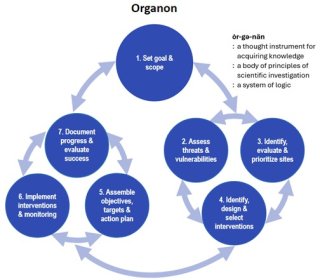
2024-EPA Tool for Climate Change Planning
EPA developed and released a tool to help climate resilience decision-making called the Adaptation Organon (AO). The AO is an information resource, planning framework, and design process for integrating climate adaptation and resilience into natural resource management.
2024-Public Release of EPA’s Dynamically Downscaled Ensemble (EDDE)
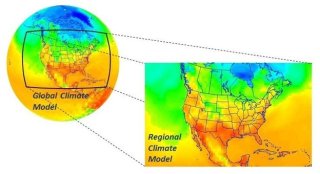
EPA's EDDE is a collection of physics-based modeled data that represent historical and future atmospheric conditions under different scenarios across much of North America out to the year 2100. The EDDE dataset can be used to quantify regional and local changes to extreme weather and climate over the contiguous U.S. in a physically consistent framework with both high temporal and spatial resolution.
EPA Dynamically Downscaled Ensemble (EDDE)
2023-Fifth National Climate Assessment Released
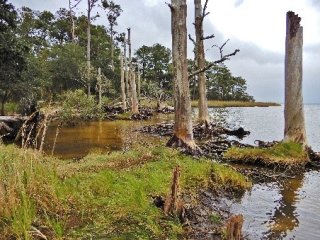
NCA5 is the U.S. Government’s authoritative assessment of scientific information about climate change risks, impacts, and responses. EPA researchers significantly contributed to this new assessment, as chapter leads, authors, technical contributors, or review editors. It is a congressionally mandated interagency effort that provides the scientific foundation to support informed decision-making across the United States.
The Fifth National Climate Assessment
2023 – GLIMPSE - GCAM Long-term Interactive Multi-Pollutant Scenario Evaluator
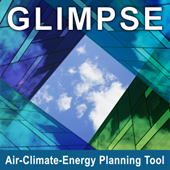
GLIMPSE is a decision support tool to assist EPA program offices, states, researchers, and others with long-term environmental and energy planning. GLIMPSE acts as a graphical user interface for GCAM, the Global Change Analysis Model, bringing this complex and powerful model to a much broader set of users.
GLIMPSE – A computational framework for supporting state-level environmental and energy planning
2023-SuRGE

In FY23, EPA researchers completed a three-year effort assisting with the Survey of Reservoir Greenhouse gas Emissions (SuRGE) project based in Cincinnati, OH. This year, four reservoirs were sampled during two field campaigns. The first trip was to Lake Hamilton in Hot Springs, AR, and Cotile Lake outside of Alexandria, LA. The second trip was to Boulder Reservoir in Boulder, CO and Crooked Creek Reservoir in Ville Platte, LA. This brings the total to 16 reservoirs (with 15 sites at each) sampled for this project over 3 years. At each site, ebullition rates were measured using gas collected in inverted funnels following overnight deployment, diffusive emission rates were measured using a floating chamber attached to a portable greenhouse gas analyzer, and a Hydrolab HL7 sonde was used to measure water temperature, specific conductivity, dissolved oxygen, pH, chlorophyll, and turbidity 0.1 m below the surface and either 1 m or 0.5 m from the bottom of the reservoir, depending on site depth. The deepest site at each reservoir is designated the “index site.” Sampling at this site included all previous measurements with the addition of deep and shallow water chemistry, deep and shallow dissolved gas, and algal indicators.
2023-Extramural Research to Advance Climate Change Science

EPA funds climate change research grants to improve knowledge of the health and environment effects of climate change and provide sustainable solutions for communities to effectively manage and reduce the impacts of a changing climate. A collection of recently funded projects are advancing the science around climate change and environmental justice while directly engaging communities in the research.
Drivers and Environmental Impacts of Energy Transitions in Underserved Communities Grants
2022-EPA Scientists Study the Carbon-Storing Power of Seagrass to Fight Climate Change
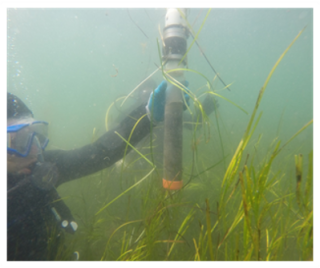
Seagrass meadows make up a powerful carbon storage system—one that, if properly managed, could help rein in global carbon dioxide emissions responsible for climate change. To learn how much carbon is stored in seagrass meadows, EPA researchers sampled seagrass and sediments from 11 meadows in the New England region, finding valuable data that could help us understand worldwide carbon budgets and address seagrass management issues.
2021 - EPA Provides Tools and Resources to Prepare Communities for Climate Change and Extreme Storms
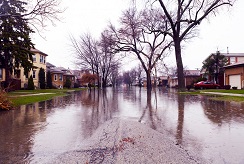
Climate change is making weather patterns less predictable with more heat waves and increased storm severity. Scientists studied precipitation event data taken over the past century and used models to determine what might happen later this century.
2021 - Saving Wild Salmon and Trout
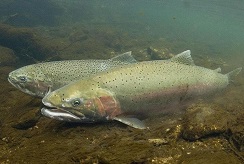
Warming trends in the Pacific Northwest from climate change are threatening salmon and trout species. Research shows how fish take advantage of warm and cold waters in the Klamath river to adapt at different times of year. The findings can help with fish conservation efforts.
Science Matters Newsletter: Warm Water May Help Cold Water Fish Adapt to Climate Change
2021 - Comparing Smoke Health Impacts from Prescribed Fires and Wildfires
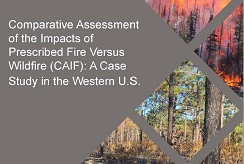
EPA released a report comparing the air quality and health impacts of smoke from wildfires and prescribed fires used for land management purposes. The findings can be used to help reduce impacts of wildfire smoke in communities.
2021 - COMET Model Blazes Path for Cleaner Energy in Cities

The City-based Optimization Model for Energy Technologies (COMET) is helping cities reduce carbon emissions and other harmful pollution to meet clean energy goals and protect public health by evaluating different energy-related technologies and policies that a city might use in the future. Researchers piloted the modeling tool with New York City.
City-based Optimization Model for Energy Technologies (COMET)
2021 - Simulations Show Impact of Climate Change on Air Quality and Health
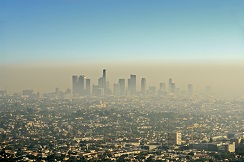
Researchers explored the future effects (in years 2050 and 2095) of warming temperatures due to climate change on ozone formation. In one modeling simulation, they projected full implementation of enacted air pollution regulations can reduce the increase of ozone despite warmer temperatures, thus reducing potential deaths from exposure.
2010s
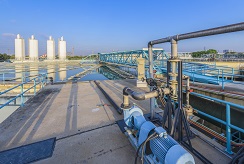
2019 - Study Examines Vulnerability of Waste Infrastructure to Climate-induced Impacts in Coastal Communities
Researchers completed a study to better understand the effects of climate-induced extreme weather events and their impacts, such as sea level rise, storm surge, and flooding, on waste management facilities and their operation. Coastal communities can use the information to develop long-term planning to minimize the impacts of climate change on waste management infrastructure.
Vulnerability of Waste Infrastructure to Climate-Induced Impacts in Coastal Communities
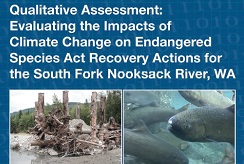
2017 - Assessment Evaluates the Impacts of Climate Change on Salmon
EPA researchers conducted a qualitative assessment to provide a comprehensive analysis of climate change impacts on freshwater habitat and Pacific salmon in the South Fork Nooksack River in the state of Washington. The assessment identified and prioritized climate change adaptation strategies or recovery actions for the South Fork to protect the endangered fish species.
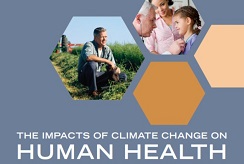
2016 - First National Assessment of Climate Impacts to Human Health Improves Understanding of Threat
EPA co-leads development of the Impacts of Climate Change on Human Health in the United States: A Scientific Assessment, coordinated and published by the United States Global Change Research Program. The assessment presents information to enhance understanding and inform decisions about the growing threat of climate change to the health and well-being of residents of the United States.
The Impacts of Climate Change on Human Health in the United States: A Scientific Assessment
2012 - EPA Publishes Climate Change Impacts to Watersheds
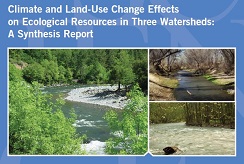
EPA publishes a report that summarizes climate change impacts to selected watersheds and recommendations for how to improve the process of conducting watershed assessments in the future.
Climate and Land-Use Change Effects on Ecological Resources in Three Watersheds: A Synthesis Report
2000s
2009 - EPA Publishes Greenhouse Gases Endangerment Finding
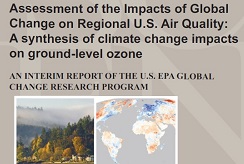
EPA publishes a report and an accompanying synthesis article that describes the potential effects of climate change on regional air quality in the United States. These products were the culmination of nearly a decade of EPA-led research and a major scientific pillar of the 2009 Endangerment Finding, which states that greenhouse gases pose an endangerment to public health and welfare and are therefore air pollutants that need to be addressed under the Clean Air Act.
A Preliminary Synthesis of Modeled Climate Change Impacts on U.S. Regional Ozone Concentrations
2001 -EPA Co-Authors the First National Climate Assessment
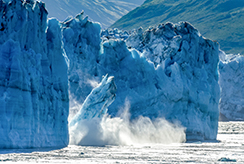
EPA co-authors the first National Climate Assessment, which was coordinated by the United States Global Change Research Program. The report provides a comprehensive assessment on climate change impacts in the United States. EPA co-authored subsequent National Climate Assessments in 2009, 2013, and 2018.
